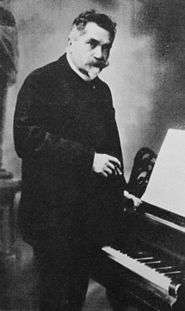Vasily Safonov
Vasily Ilyich Safonov (Russian: Васи́лий Ильи́ч Сафо́нов, Vasi'lij Ilji'č Safo'nov; 6 February 1852 – 27 February 1918), also known as Wassily Safonoff, was a Russian pianist, teacher, conductor and composer.

Biography
Vasily Safonov, or Safonoff as he was known in the West during his lifetime, was born at Ishcherskaya (also known as Itschory, Itsyursk, or Itsiursk), Russian Caucasus (now in Chechnya), son of the Cossack General Ilya Ivanovich Safonov.[1]
Vasily was educated at the Imperial Alexandra Lyceum, Saint Petersburg, and at the Saint Petersburg Conservatory of Music 1881-1885 under Louis Brassin. He graduated as Bachelor of Laws, and won the gold medal as a pianist of the Conservatory. He was also a pupil of Theodor Leschetizky and Nikolai Zaremba.[1]
Vasily Safonov had several daughters. Anna Vasilyevna Timiryova (1893-1975) was a poet who spent much of her life in labor camps or in exile.[2] Varvara Vasilievna Safonova (1895-1942), a painter, died during the siege of Leningrad. Yelena Vasilievna Safonova (1902-1980), studied painting, designed theatre costumes, and published children's books. From 1932 to 1958 she lived in exile in the city of Kursk.[3]
Safonov was never a particularly successful composer in his own right, but was a master music educator, becoming Director of the Moscow Conservatory in 1889. He was the director of the National Conservatory of Music in New York.

and Aglaida Fridman.
He was the teacher of some of the best Russian pianists, notably Alexander Scriabin, Nikolai Medtner, Josef Lhévinne and Rosina Bessie (later Lhévinne). He was also a teacher of Marthe Servine, a French-American composer and pianist. See: List of music students by teacher: R to S#Vasily Safonov.
After retiring from teaching, Safonov became well known as a conductor. He was the conductor of the first Moscow performance of Tchaikovsky's Pathétique Symphony (No. 6), on 4/16 December 1893, seven weeks after its premiere under the composer's baton and six weeks after his death.[4]
He conducted nearly all the principal orchestras in Europe, including the Philharmonic Orchestras of Berlin, Vienna and Prague, the Lamoureux Orchestra of Paris, the London Symphony, the Orchestra dell'Accademia Nazionale di Santa Cecilia and the New York Philharmonic Society.[5]
Safonov is the first known modern conductor to have dispensed with the use of the baton, which came about when he forgot to take his baton to a rehearsal on a certain occasion; he chose to use his hands alone, and decided that from then on a baton was entirely unnecessary.[6] Safonov died in Kislovodsk on 27 February 1918, aged 66.
His real voice
References
- "Contemporaries Vasily Safonov (1852-1918)". Gustav-Mahler.eu. Retrieved 2 March 2017.
- "Kolchak's final love". Historical Omsk. Retrieved 2 March 2017.
- Homage to Savitsky: Collecting 20th-Century Russian and Uzbek Art. Arnoldsche Art Publishers. 2015. pp. 144–151. ISBN 9783897904309.
- Tchaikovsky Research; accessed 18 November 2014.
- "RUSSIAN LEADER FOR THE PHILHARMONIC; Mr. Safonoff of Moscow Conducts Its Seventh Public Rehearsal" (PDF). Retrieved 2016-08-03.
- Grove's Dictionary of Music and Musicians, 5th ed, 1954, Vol. VII, p. 359
![]()
|title= (help)
External links
| Wikimedia Commons has media related to Vasily Ilyich Safonov. |